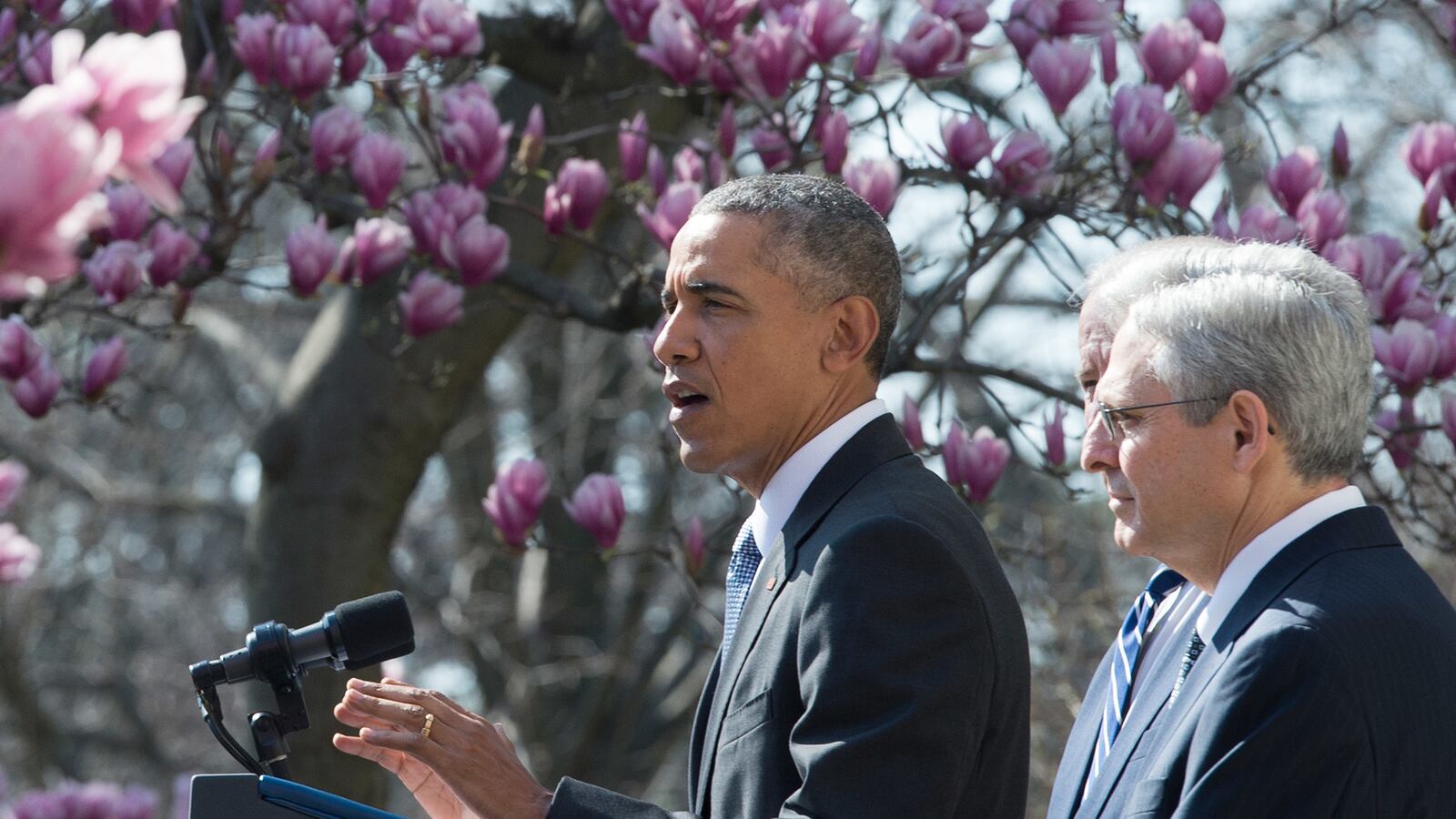Judge Merrick Garland signaled the Obama administration’s strategy to score as many political points as possible in the face of Republican opposition to his nomination to the Supreme Court during a short speech in the Rose Garden.
The strategy can be summed up in three words: humanize, humanize, humanize.
Polls show that between 55 and 70 percent of Americans want the Senate to hold hearings on a potential Supreme Court nominee. But that’s just in the abstract. Now there’s a real person at stake—a face, not an abstraction. Garland is the son of immigrants from a small town who put himself through Harvard Law School; he is safe, moderate, and likable.
In other words: completely qualified and unobjectionable.
But Republicans leaders say they won’t let the Senate vote on Garland.
In fact, they don’t plan on even letting him in the door because “the people” should fill the vacancy left by Antonin Scalia’s death, Majority Leader Mitch McConnell said on the Senate floor.
“Neither the qualifications of this nominee or who might make the next selection matter unless you truly don’t believe that the principle here is that people need to be part of this decision,” said Sen. Roy Blunt (R-MO), a member of the GOP leadership team.
Republicans don’t want to be seen opposing Garland on the basis of merit, but the White House plans to make them look like they are putting a good man through hell. In the space of just 700 words, Garland showed how the humanization strategy might play out along three themes: his own personal story, the rule of law, and the fight against terrorism.
First is Garland’s personal narrative. In his speech, he told a stirring story about his Jewish ancestors fleeing persecution. (Garland’s mother is Jewish; his father was not.)
“My grandparents left the Pale of Settlement… in the early 1900s, fleeing anti-Semitism and hoping to make a better life for their children in America,” he said, choking up when he discussed his family. “My father, who ran the smallest of small businesses from a room in our basement, took me with him as he made the rounds to his customers, always impressing upon me the importance of hard work and fair dealing.”
Garland’s immigrant ancestry is a powerful story, especially in the age of Donald Trump, but that did not mute liberal concerns about Obama picking a white male over other candidates like Sri Srinivasan (Indian), Jane Kelly (female), and Paul Watford (black).
“The only path forward given Republican intransigence on this would [have been to] put forward a nominee that is going to inspire grassroots activists and frankly American people all across this country so much that the pressure would ramp up so intensely that Republicans would have to cave,” Neil Sroka of Democracy for America told The Daily Beast. “I don’t see anything about Judge Garland that’s going to inspire that sort of excitement.”
Nevertheless, liberals aren’t going to try to sink Obama’s pick when President Trump is a possibility, however remote.
The second major theme in Garland’s speech was about the human face of the rule of law. While prosecuting gang members, Garland said that “the hardest job we faced was persuading mothers and grandmothers that if they testified, we would be able to keep them safe and convict the gang members. We succeeded only by convincing witnesses and victims that they could trust that the rule of law would prevail.”
This was a none-too-subtle dig at Senate Republican obstructionism, which would leave a Supreme Court seat vacant for the longest time in history, defy a clear duty set forth in the Constitution, and possibly undermine public confidence in the judiciary itself.
“They are establishing a precedent, if they do this, that if you don’t like the president, you never have to have a vote. Ever,” said Sen. Tim Kaine (D-VA), who argues that the obstruction flies in the face of the constitutional order of government. “What this is about is, ‘We don’t like this president and so we are going to refuse to entertain any discussion of the president’s nominees.’”
Garland framed this crisis not in abstract terms but in personal ones. When you undermine the rule of law, he told the GOP, you’re endangering these mothers and grandmothers. Once again, a human face on a political conflict.
Third, Garland offered a human face to his personal fight against terrorism, like when he prosecuted Timothy McVeigh.
“I saw the importance of assuring victims and families that the justice system could work,” he said. “We promised that we would find the perpetrators, that we would bring them to justice, and that we would do it in a way that honored the Constitution.”
It’s easy to read this as another jab at GOP obstructionism.
“The justice system could work,” unlike refusing to grant a hearing to a nominee. “In a way that honored the Constitution,” unlike ignoring the Appointments Clause. But if it’s a jab, it’s a classy jab: hitting major themes that befit a Supreme Court justice but avoiding direct attacks and personalizing them in a way as to generate sympathy, or even admiration.
The White House will leave Democrats to make that argument more explicitly.
“The fact that they’re going to not follow the Constitution, I believe, is going to have impacts on this election,” said Sen. Jon Tester (D-MT), the chair of the campaign arm of Senate Democrats.
Democrats would be able to use some Republicans against their own party.
“I believe the American people are best served when we follow normal order,” said Sen. Susan Collins (R-ME). “I’ve found that one-on-one exchanges with judicial nominees frequently gives you a very good understanding of their temperament, their intellect, their fidelity to the Constitution, so I look forward to sitting down with him.”
Garland seemed above the political fray during his speech from the Rose Garden, like a throwback to an earlier time of civility and comity. (President Obama, it has been observed, has recently taken a similar tone.) He appeared not only presidential, but judicial—the nicest person in the room. This is the guy the Republicans are going to stonewall? Democrats will ask.
As always, appearing apolitical turns out to be a canny political move. If the Garland nomination fails, Republican intransigence might well cost them some Senate seats (namely Charles Grassley’s in Iowa) as voters express disgust at the treatment Garland received.
But if by some miracle it succeeds, Justice Garland’s appointment will represent an enormous victory—not for Democrats over Republicans, but for reason over reaction. Even, in a way our politicians may have forgotten, for class.







